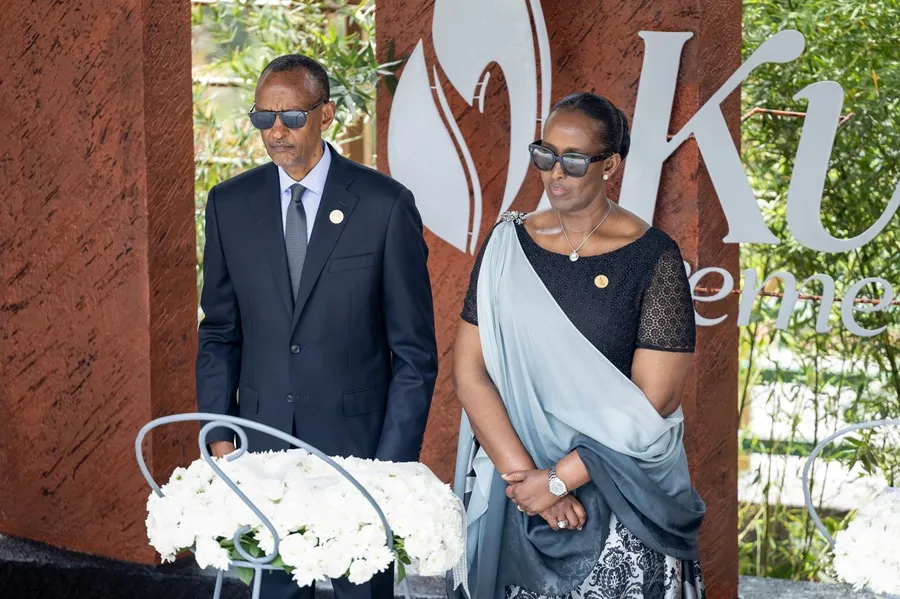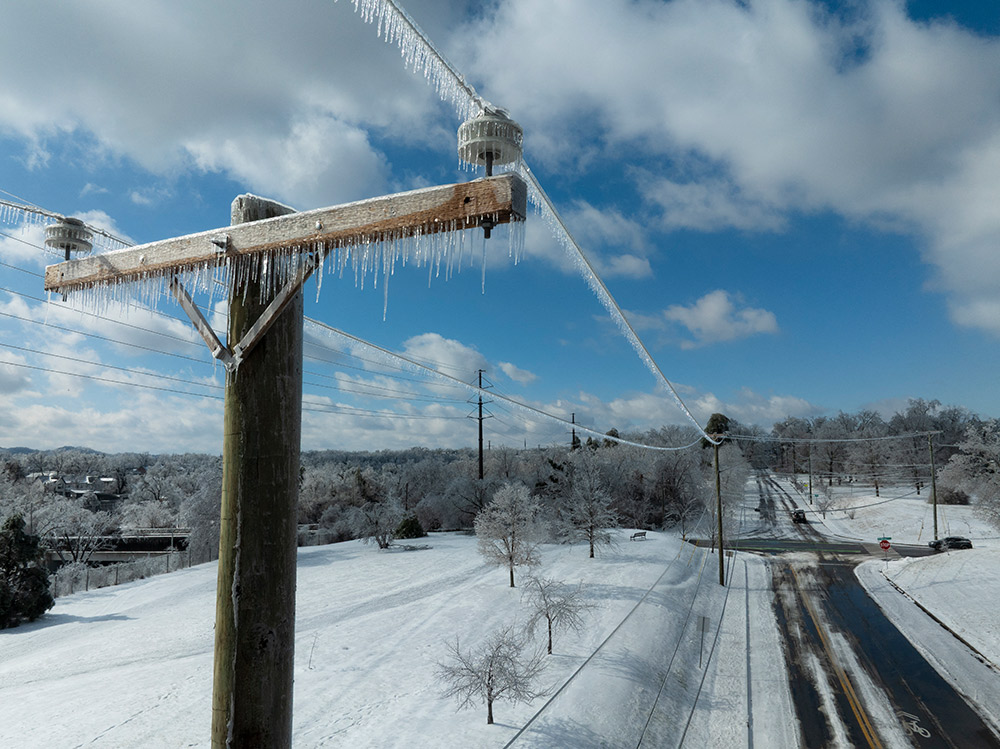International
Rwanda begins the commemoration of the thirtieth anniversary of the 1994 genocide

Rwanda began this Sunday the hundred days of mourning established by the country to commemorate the thirtieth anniversary of the 1994 genocide in which more than 800,000 moderate Tutsis and Hutus were killed, a massacre that still shookes the world and Rwandan society.
To begin the commemoration, the country’s president, Paul Kagame, lit accompanied by the first lady, Jeannette, the traditional flame of remembrance at the Center in Memory of the Genocide in the capital, Kigali, where more than 250,000 victims of the massacre lie in mass graves.
In a solemn act with moments of silence only interrupted by the commemorative songs singed by a military band and by the protocol instructions, a dozen heads of state and government paid their respects to the white cement blocks where the graves of the victims are housed.
Among the leaders present were the Prime Minister of Ethiopia, Abiy Ahmed, and the presidents of South Africa, Cyril Ramaphosa; Central African Republic (RCA), Faustin-Archange Touadera; Madasgascar, Andry Rajoelina; South Sudan, Salva Kiir; Republic of the Congo, Denis Sassou Nguesso; Tanzania, Samia Suluhu Hassan; and the Czech Republic, Petr Pavel.
Likewise, the head of state of Mauritania and current president of the African Union (AU), Mohamed Ould Ghazouani, and the president of Israel, Isaac Herzog, attended on the same day that it is precisely six months since the beginning of the war in the Gaza Strip, for which Tel Aviv faces accusations of genocide in the International Court of Justice (ICJ).
Several former presidents, including the American Bill Clinton or the French Nicolás Sarkozy, as well as the president of the AU Commission, Moussa Faki Mahamat, and the president of the European Council, Charles Michel, also traveled to Kigali to join the memory acts.
The commemoration program that starts today throughout the country includes the prohibition of large celebrations, such as weddings or sports competitions, and the organization of concerts and other cultural or leisure events not related to genocide in bars and public spaces.
In addition, within the framework of these events, the United Nations Educational, Scientific and Cultural Organization (UNESCO) has issued new certificates to register four other monuments commemorating the genocide as world heritage sites, in Kigali, Bisesero (west), Nyamata (southeast) and Murambi (south).
“This means the international recognition that what happened in Rwanda is a tragedy, not only for Rwanda but also for the entire international community, all of humanity,” the director general of Unesco, Audrey Azoulay, told the press on Friday.
The one hundred days of mourning marked by the Rwandan Government will conclude on April 13 with an act at the Center for the Memory of the Genocide of Rebero (Kigali), in memory of the politicians who were killed for opposing the massacre.
The genocide began on April 7, 1994 after the murder the day before of the presidents of Rwanda, Juvénal Habyarimana, and Burundi, Cyprien Ntaryamira (both Hutus), when the plane in which they were traveling was shot down over Kigali.
The massacre that followed – the Rwandan Government accused the Tutsi rebels of the Rwandan Patriotic Front (RPF) of the murder, against whom it had been waging a war since 1990 – caused the death of at least 800,000 moderate Tutsis and Hutus in just over three months.
The genocide was one of the worst ethnic killings in the recent history of humanity.
Paul Kagame warned this Sunday in his speech that the conditions for an ethnic killing can occur anywhere if they are not controlled.
“The process of division and extremism that leads to genocide can occur anywhere if it is not controlled,” the president said in a forceful intervention before about 3,500 people gathered at the imposing BK Arena stadium in Kigali.
He defined any “ambiguity” about who were the victims of the genocide as “a form of denialism, which constitutes a crime.”
The president referred to the situation in the east of the neighboring Democratic Republic of the Congo (DRC), whose Kigali Army he accuses of supporting the rebel group Democratic Forces for the Liberation of Rwanda (FDLR), founded in 2000 by leaders and other Hutu Rwandans exiled in that country.
“The remains of those forces (perpetrators of the killing) are still in the east of the Congo today,” Kagame said, assuring that they have the “full support of the blue helmets of the United Nations” and that “their objectives have not changed.”
International
Winter Storm Fern Leaves 30 Dead and Over One Million Without Power Across the U.S.

The massive winter storm Fern, bringing polar temperatures, battered large portions of the United States for a third consecutive day on Monday, leaving at least 30 people dead, more than one million households without electricity, and thousands of flights grounded.
In the Great Lakes region, residents awoke to extreme cold, with temperatures dropping below -20°C. Forecasts indicate that conditions are expected to worsen in the coming days as an Arctic air mass moves south, particularly across the northern Great Plains and other central regions, where wind chills could plunge to -45°C, temperatures capable of causing frostbite within minutes.
Across the country, heavy snowfall exceeding 30 centimeters in roughly 20 states triggered widespread power outages. According to PowerOutage.com, nearly 800,000 customers remained without electricity on Monday morning, most of them in the southern United States.
In Tennessee, where ice brought down power lines, approximately 250,000 customers were still without power. Outages also affected more than 150,000 customers in Mississippi and over 100,000 in Louisiana, as utility crews struggled to restore service amid dangerous conditions.
International
Spain approves plan to regularize up to 500,000 migrants in Historic Shift

In November 2024, Spanish Prime Minister Pedro Sánchez announced a reform of the country’s immigration regulations aimed at regularizing 300,000 migrants per year over a three-year period, in an effort to counter population aging in a country where births have fallen by 25.6% since 2014, according to official data.
Going against the trend in much of Europe, Spain’s left-wing government has now approved an exceptional migrant regularization plan that could benefit up to 500,000 people, most of them from Latin America.
The measure will allow the regularization of around “half a million people” who have been living in Spain for at least five months, arrived before December 31, 2025, and have no criminal record, Migration Minister Elma Saiz explained on public television.
The plan, approved on Tuesday by the Council of Ministers, establishes that applications will be processed between April and June 30, enabling beneficiaries to work in any sector and anywhere in the country, Saiz said.
“Today is a historic day for our country. We are strengthening a migration model based on human rights, integration, and one that is compatible with economic growth and social cohesion,” the minister later stated at a press conference.
The socialist government of Pedro Sánchez stands out within the European Union for its migration policy, contrasting with the tightening of immigration measures across much of the bloc amid pressure from far-right movements.
Central America
Honduras swears in conservative president Asfura after disputed election

Conservative politician Nasry Asfura assumed the presidency of Honduras on Tuesday with an agenda closely aligned with the United States, a shift that could strain the country’s relationship with China as he seeks to confront the economic and security challenges facing the poorest and most violent nation in Central America.
Asfura’s rise to power, backed by U.S. President Donald Trump, marks the end of four years of left-wing rule and secures Trump another regional ally amid the advance of conservative governments in Chile, Bolivia, Peru, and Argentina.
The 67-year-old former mayor and construction businessman was sworn in during an austere ceremony at the National Congress, following a tightly contested election marred by opposition allegations of fraud and Trump’s threat to cut U.S. aid if his preferred candidate did not prevail.
Grateful for Washington’s support, Asfura—who is of Palestinian descent—traveled to the United States to meet with Secretary of State Marco Rubio, before visiting Israeli Prime Minister Benjamin Netanyahu.
“We need to strengthen relations with our most important trading partner,” Asfura said after being declared the winner of the November 30 election by a narrow margin, following a tense vote count that lasted just over three weeks.
-

 Central America2 days ago
Central America2 days agoGuatemala seizes over a ton of cocaine hidden in flour at Pacific port
-

 Central America5 days ago
Central America5 days agoGuatemala’s president rules out negotiations with inmates after prison riots
-

 International4 days ago
International4 days agoTrump-Era Defense Plan Prioritizes Border Security and Scales Back Global Commitments
-

 Internacionales5 days ago
Internacionales5 days agoMajor winter storm threatens “catastrophic” ice and snow across much of the U.S.
-

 International4 days ago
International4 days agoBogotá and Quito Seek Dialogue After Tariffs and Power Cut Escalate Tensions
-

 International3 days ago
International3 days agoDelcy Rodríguez seeks political agreements after Maduro’s ouster
-

 International5 days ago
International5 days agoGuatemala considers sending high-risk gang members to military prisons
-

 International2 days ago
International2 days agoHistoric snowstorm paralyzes Toronto after 60 centimeters of snow
-

 International2 days ago
International2 days agoSpain’s irregular migrant population rises to 840,000, study finds
-

 International3 days ago
International3 days agoFederal immigration agents kill man in Minneapolis, sparking protests and outrage
-

 International5 days ago
International5 days agoRights group says over 5,000 killed in Iran protests, mostly civilians
-

 Central America21 hours ago
Central America21 hours agoGuatemala Police Arrest Prison Guard Caught in the Act of Extortion
-

 Sin categoría21 hours ago
Sin categoría21 hours agoEight Killed in Series of Armed Attacks in Ecuador’s Manabí Province
-

 International21 hours ago
International21 hours agoWinter Storm Fern Leaves 30 Dead and Over One Million Without Power Across the U.S.
-

 Central America21 hours ago
Central America21 hours agoHonduras swears in conservative president Asfura after disputed election
-

 International21 hours ago
International21 hours agoDoomsday clock moves to 85 seconds before midnight amid rising global risks
-

 International2 days ago
International2 days agoRights group says nearly 6,000 killed in Iran protest crackdown
-

 Central America22 hours ago
Central America22 hours agoBukele leads public trust rankings as UCA survey highlights gains in security
-

 International21 hours ago
International21 hours agoSpain approves plan to regularize up to 500,000 migrants in Historic Shift
-

 International2 days ago
International2 days agoVenezuela frees at least 80 political prisoners, NGO says
-

 Sin categoría21 hours ago
Sin categoría21 hours agoEl Salvador Launches Fourth Year of Ocean Mission to Protect Marine Ecosystems
-

 International2 days ago
International2 days agoEU launches new probe into X over AI-generated fake nude images
-

 International2 days ago
International2 days agoSevere winter storm grips U.S., leaves multiple dead as extreme cold persists
-

 International2 days ago
International2 days agoFrance debates ban on social media for children under 15


























